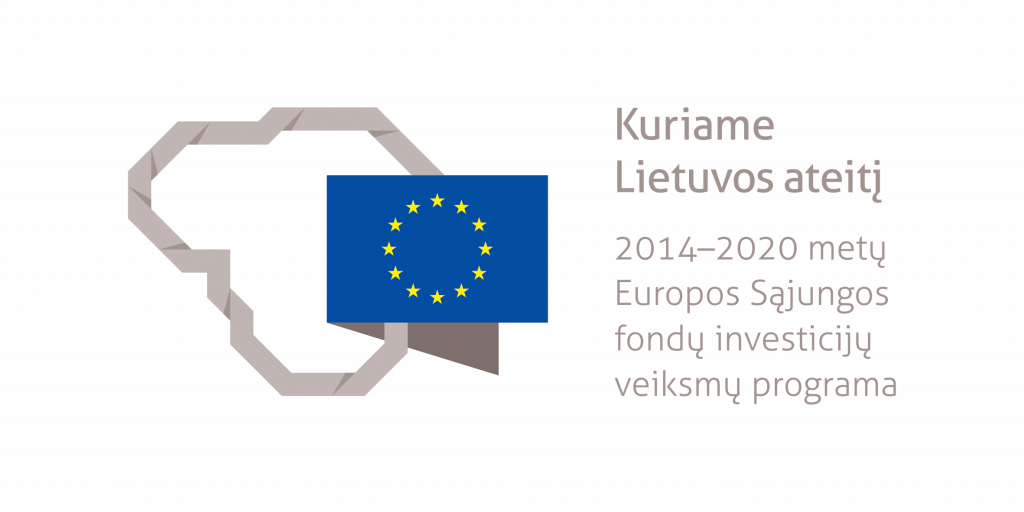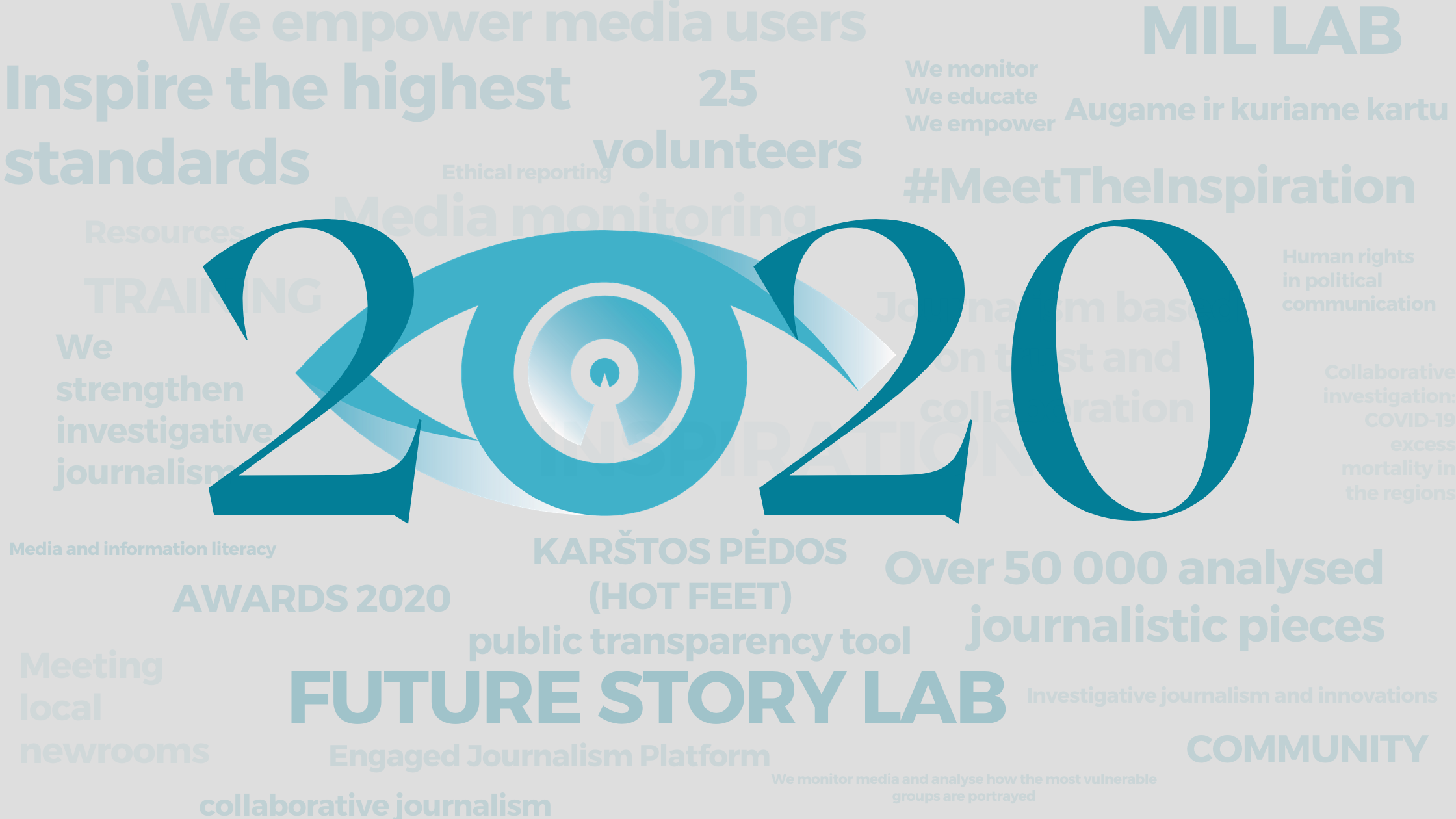Media4change team has been monitoring Lithuanian media during October 2018, observing journalists’ publications on mental health, sexual orientation and migration. After gathering the data our experts are analyzing them, concentrating on: how media is portraying these groups, how society integrates with them, how groups are described form political view, what stereotypes are created for these groups and in which context they are appearing.
MEDIA MONITORING: OCTOBER 2018
Media4change team has been monitoring Lithuanian media during October 2018, observing journalists’ publications on mental health, sexual orientation and migration. After gathering the data our experts are analyzing them, concentrating on: how media is portraying these groups, how society integrates with them, how groups are described form political view, what stereotypes are created for these groups and in which context they are appearing.
Publications were monitored by specific criteria such as quantity (themes, genres) and quality (source comparing, title analysis) and were chosen from national and regional media.
SEXUAL ORIENTATION
On October 2018, Lithuanian media has published 118 pieces that are referring to sexual orientation. The most common terms were – ‘homosexual’, ‘gay’, ‘orientation’. However, there was no mention regarding gender transitioning.

1. The most frequent keyword in October – ‘homosexual’ while ‘transgender’ was the rarest.
PASSIVE ASPECT
While conducting media monitoring, one of the most important aspects is if social groups are shown as “active” or not. For example, we are observing whether those groups were interviewed or only just mentioned without “making their voice being heard”. This shows how particular social groups are presented to the audience and if they are a passive or active part of society.
On October, interviews with journalists about sexual orientation recorded 57 percent of all publications. However, most interviewed people were politicians and experts. More specifically, our findings show that: lesbian was interviewed only once, gay – 6, homosexual relative – 2 times. This shows that homosexuality in media is abstract and passive.

2. On October regarding sexual orientation, most interviewed people were politicians and experts.
CONTEXT
A neutral context in journalistic publications is where both sides of opinions are presented and facts and researches are discussed.
A positive context that is presented in this monitoring is mostly coverage about prizes and events.
A negative context includes criminal events, conflicts, and is usually connected with specific groups.
Our findings show that at some publications there were raised questions about LGBT rights such as marriage, partnership, and family concept. Sometimes LGBT community is presented as devastating “Traditional society”. For example, in an article with the title, The Family is fearful was discussed about the Lithuanian Constitution laws about homosexual couples who are getting married abroad. From the beginning of the article, the negative tone is obvious writing: “If we would not do anything about it, soon we are going to harvest the fruit of this kind of tolerance. Most probably we are going to pay for it in the exchange with the traditional family”.
While conducting media monitoring, our team observed that the LGBT community usually appears in politician context and conversations when presidential elections are about to happen. The candidates include questions about homosexual couples while mentioning the issue of family structure.
At the same time, the content that fights for homosexual rights is often characterized as propaganda. It is more visible, especially in interviews or comments. For example, in one of the interviews, the interviewer believes that the education system is “feeding” LGBT community with politician requirements and the support of propaganda. Another article with the title “Male and female marriage or free partnership – what do you want Lithuania?” stated that the same gender relationships are described as propaganda spread by homosexual people: “First, it turns out that Lithuanians are very resisting, about the” free love “propaganda, whereas in Europe heterosexual people are starting to associate themselves as a minority or even outsiders.”
In Lithuanian media there are many publications about sexual orientation, however, most of the publications (66%) are not authorized. They are given by newsagents with no signatures.
MENTAL HEALTH
Media4change experts observed that in Lithuanian media mental health keywords were mentioned in 82 publications (45 articles with 15 interviews). Regarding the context, most of the publications in October are neutral (63%)-22 % are positive and 14% – negative. At the same time, our data show that most of the publications on mental health were published on the internet.
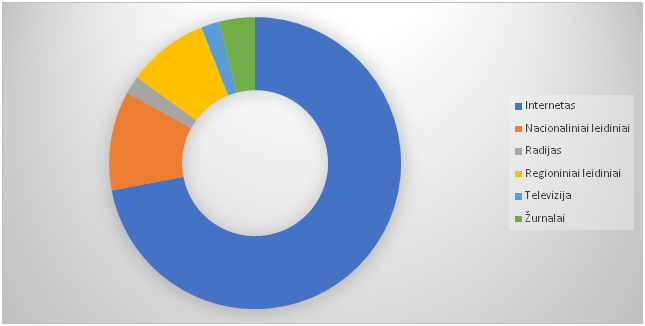
3. Almost all publications about mental health are on the internet.
Even though slightly more than half (57%) of media content is about mental health issues, people with mental disorders still remain a silent group in Lithuanian media, as they were interviewed only in 11 publications. Moreover, most journalists’ pieces on mental health are impersonal and mental disorders are mentioned episodically, in articles and crimes reports.
MIGRATION
Media4change media monitoring is showing that in October, there were recorded 137 journalist publication in various media regarding migration issue. Most of them are articles (41%) and other plenty of expanded messages (30%).
The term “migrant” was one of the most commonly mentioned (66 times), while “immigrants” and “refugees” were mentioned in 46 journalists’ publications in Lithuanian media on October.
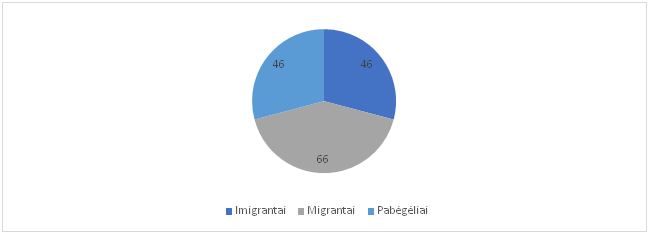
4. On October, the most commonly used keyword in the works of journalists was “Migrant” (66 times).
Media4change experts recorded 29 media publications. The migration issue was mainly reported in the online press (74%) and in regional publications (12%).
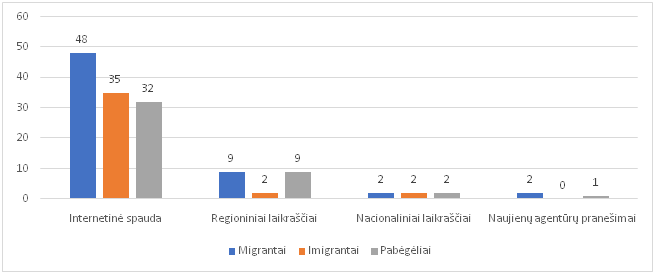
5. Distribution of journalism papers on migration by media platforms.
Most of the media narratives on migration issues are neutral (72%). In a negative context, migration is represented twice as often as in a positive one.
More specifically, migrants were shown mostly in a negative context on Lithuanian media on October 2018. There were many reports about crimes; for example, an attempt to cross the border illegally (“12 illegal migrants were transported by Latvian citizens”). In several publications, there is the belief that migrants are dangerous to the security of the people of Lithuania. In the negative context, migration is also about the laws of the European Union. In the Vakaru Ziniu article “Reflecting Turkey’s Refugees We Millions” refugees are called “illegal”.
On the contrary, in positive journalistic publications-which was only 8%- the most commonly discussed topic was refugees. The most dominant subject was regarding refugee integration and events for refugees, for example “On the football court met with refugee children”.
* Media monitoring is monitored by these media:
National newspapers: Lietuvosrytas, Lietuvos žinios, Vakaro Žinios, Lietuvos audas. Verso Žinios, Valstiečių laikraštis, Lietuvos rytas/Sostinė, Ūkininko patarėjas, Akistata, karštas Komentaras, Šiaurės Atėnai, Lietuvos rytas/Laikinoji sostinė, Kaimo laikraštis, Laisvas laikraštis, 7 menodienos, Bičiulystė, Lietuvos aidas/ Naujausios žinios, Lietuvos rytas/ Gyvenimo būdas.
Regional newspapers: Kauno diena, Klaipėda, Vakarų ekspresas, Šiaulių naujienos, Sekundę, Santaka, Panevėžio kraštas, Šiaurės rytai, Sidabrė, Suvalkietis, Gimtasis Rokiškis, Darbas, Vilniaus diena, Alytaus naujienos, Anykšta, Vilniaus krašto savaitraštis, Ukmergės žinios, Zarasų kraštas, Biržiečių žodis, Joni6kio dienos.
Radio: LRT radijas, Žinių radijas, FM99, Pūkas, Lietus, M1, M1 Plius.
TV: LNK, LRT, TV3, Lietuvos Rytas TV, BTV, InfoTV.
Magazines: Moteris, Savaitė, Moters savaitgalis, Prie kavos, Žmonės, Lietuvos rytas/TV antena, Žmonės.Legendos, IQ. The Economist, Valstybė, Laimė, Verslo klasė, Mūsų RESPUBLIKA/Laisvalaikis, Lietuvos rytas/Stilius, Ji, Savivaldybių žinios, Moters savaitė, Jūra, Mūsų Girios, Mamos žurnalas, Edita.
Online Press: delfi.lt, 15min.lt, Lrytas.lt, diena.lt, Kauno.diena.lt, kl.lt, lrt.lt, lzinios,lt, tv3.lt, sportas.lt, alfa.lt, Respublika.lt, etaplius.lt, sputniknews.lt, bns.lt, bernardinai.lt, ve.lt, jp.lt, verslozinios.lt, spoertas.info, aina.lt, akmene,lt, akmenietis.lt, alkas.lt, alytausnaujienos.lt, anglija.lt, anyksciai.lt, birstonas.lt, birstonietis.lt, birzai.lt, birzietis.lt, birziskis.lt, budas.lt, diena.lt, druskininkai.lt, druskininkietis.lt, ekonomika.lt, elektrenai.lt, elektreniskis.lt, eli.lt, faktai.lt, fm99.lt, gargzdai.lt, geopolitika.lt, ignalina.lt, ignalinietis.lt, jonava.lt, jonavietis.lt, jonavozinios.lt, joniskelis.lt, joniskenas.lt, lrytas.lt, elta.lt.
